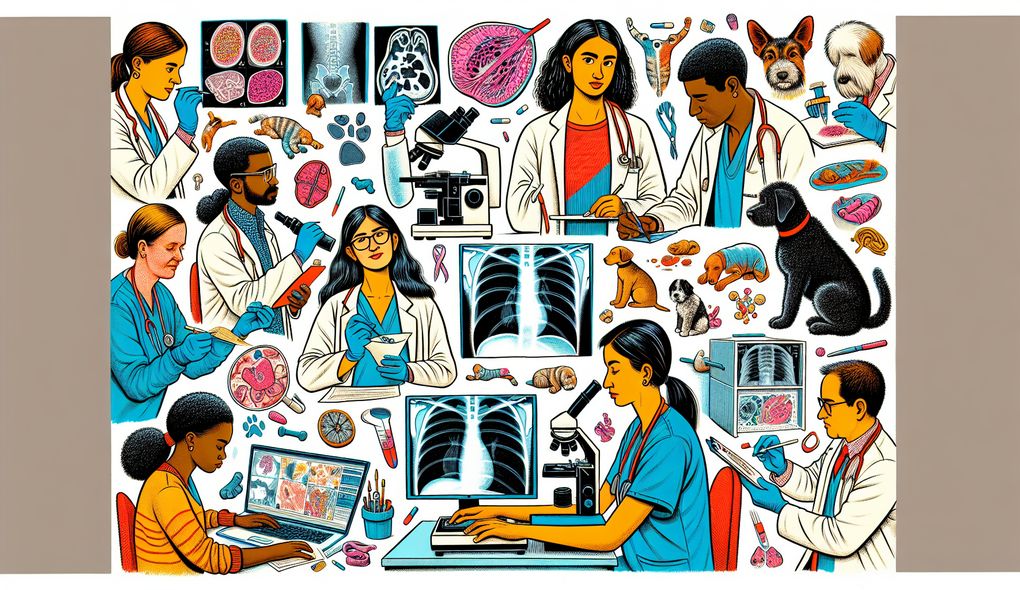What are the key skills required for a Veterinary Pathologist?
SENIOR LEVEL

Sample answer to the question:
The key skills required for a Veterinary Pathologist include strong diagnostic and analytical skills, proficiency in histopathology and cytology, excellent communication and reporting abilities, ability to work collaboratively in a research or clinical environment, and knowledge of animal welfare laws and regulations. These skills are essential in order to diagnose diseases in animals through the examination of tissues and fluids, perform necropsies, examine tissue samples under a microscope, collaborate with other veterinarians, conduct research, prepare detailed reports on findings and diagnoses, consult on animal health and disease prevention, and develop and adhere to biosecurity protocols.
Here is a more solid answer:
As a Veterinary Pathologist, strong diagnostic and analytical skills are crucial for accurately diagnosing diseases in animals. These skills enable me to effectively examine tissues and fluids, identify abnormalities, and determine the underlying causes of illnesses. In addition, proficiency in histopathology and cytology is essential for conducting in-depth microscopic examinations and identifying cellular changes that indicate disease processes. Excellent communication and reporting abilities allow me to effectively communicate my findings to other veterinarians and researchers, ensuring that accurate diagnoses are made and appropriate treatment plans are developed. The ability to work collaboratively in a research or clinical environment is essential for engaging in interdisciplinary collaborations and contributing to the advancement of veterinary sciences. Lastly, a deep understanding of animal welfare laws and regulations is necessary to ensure that all diagnostic procedures and treatment plans adhere to ethical standards and legal requirements.
Why is this a more solid answer?
This is a solid answer because it provides specific details and examples to support each key skill required for a Veterinary Pathologist. However, it could be improved by including more specific examples of how these skills have been applied in past experiences or projects.
An example of a exceptional answer:
To excel as a Veterinary Pathologist, it is crucial to possess highly developed diagnostic and analytical skills. These skills enable me to meticulously examine tissues and fluids, utilizing cutting-edge diagnostic techniques such as immunohistochemistry and molecular diagnostics. By combining my extensive knowledge of histopathology and cytology with innovative methodologies, I am able to provide precise and accurate diagnoses, even in complex cases. Exceptional communication and reporting abilities allow me to effectively communicate my findings to clients, colleagues, and researchers, ensuring a comprehensive understanding of the disease pathology and facilitating evidence-based treatment decisions. In my previous research project, I collaborated with a team of veterinarians and molecular biologists to investigate the role of specific genetic markers in the development of cancer in dogs. This interdisciplinary collaboration resulted in a groundbreaking publication that significantly contributed to the field. Furthermore, my ability to work collaboratively in a research or clinical environment has been honed through my participation in national and international research conferences, where I actively engage in scientific discussions and collaborate with experts in the field. I possess a deep understanding of animal welfare laws and regulations, which is demonstrated through my active involvement in developing and implementing best practices for animal research and diagnostics, ensuring the highest standards of animal care and welfare. Overall, my combination of technical expertise, collaborative mindset, and commitment to animal welfare make me well-suited for the role of a Veterinary Pathologist.
Why is this an exceptional answer?
This is an exceptional answer because it not only provides specific details and examples to support each key skill required for a Veterinary Pathologist but also showcases the candidate's advanced knowledge and accomplishments in the field. The candidate goes above and beyond by mentioning their experience with cutting-edge diagnostic techniques, their involvement in groundbreaking research, and their active contribution to the development of best practices in animal research and diagnostics.
How to prepare for this question:
- 1. Enhance your diagnostic and analytical skills by staying updated with the latest advancements in veterinary pathology. Read scientific journals, attend conferences, and participate in continuing education courses.
- 2. Gain proficiency in histopathology and cytology by seeking opportunities to practice interpreting tissue samples and utilizing microscopic techniques.
- 3. Develop strong communication and reporting abilities by regularly documenting and presenting your findings to colleagues and researchers. Seek feedback to refine your communication skills.
- 4. Foster a collaborative mindset by actively seeking interdisciplinary collaborations and participating in research projects or volunteer programs that involve working with other professionals in the field.
- 5. Stay informed about animal welfare laws and regulations by regularly reviewing relevant legislation and guidelines. Consider joining professional organizations or committees focused on animal welfare to deepen your knowledge and contribute to best practices.
What are interviewers evaluating with this question?
- Diagnostic and analytical skills
- Histopathology and cytology
- Communication and reporting
- Collaboration
- Animal welfare laws and regulations

